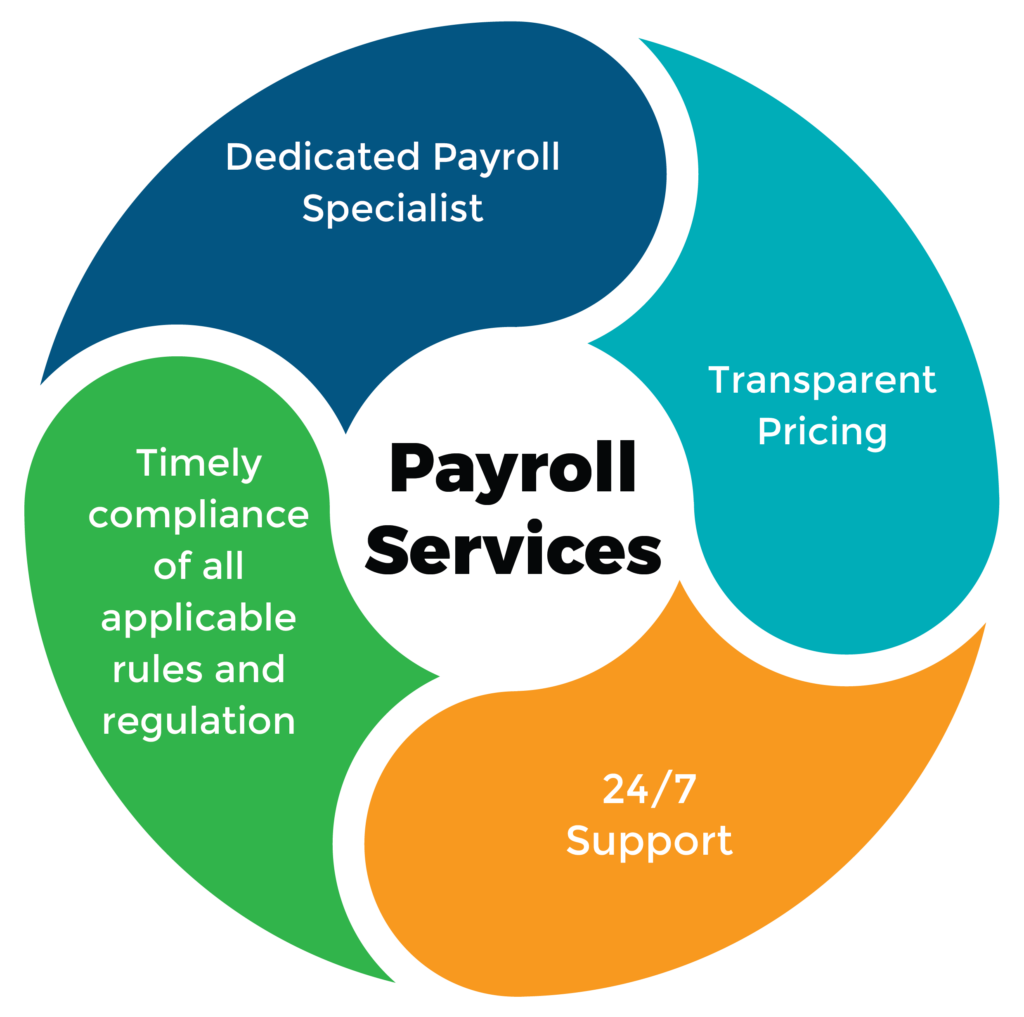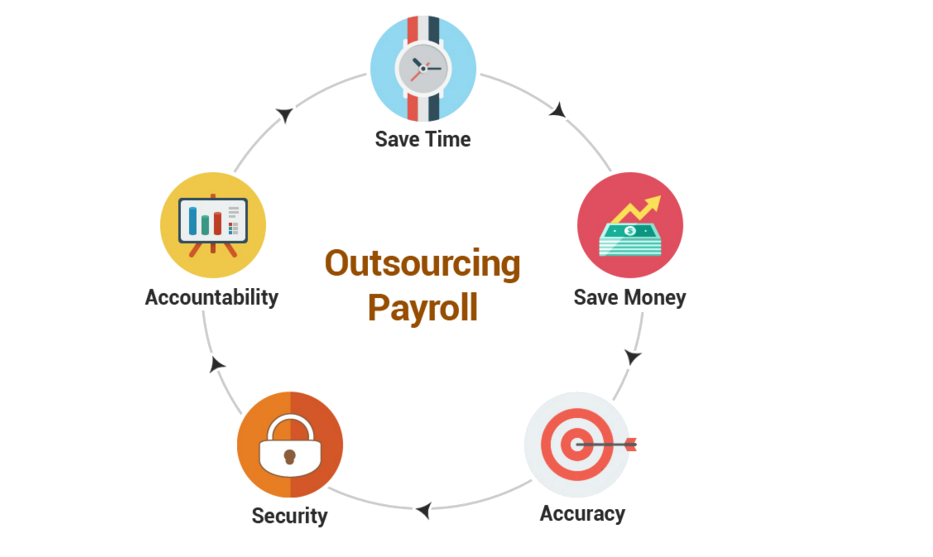Employee payroll management is often a time-consuming process unless another company is hired to handle it for you. Outsourcing payroll can provide access to payroll management experts and save you a lot of money, but it also comes with unique risks and challenges. In this guide, we explain how Outsourcing Payroll Processing works and how you can evaluate your company’s options.
The payroll process involves more than mailing checks. It encompasses a variety of tasks, not all of which are necessarily performed by the same entity. As part of the process, employees are integrated into a payroll system, and tax obligations are fulfilled at the end of the year.
In addition to collecting employee information, payroll is responsible for setting up automatic payments and direct deposits, tracking hours or timesheets, calculating wages owed, distributing pay stubs, and garnishing wages when required by law. Managing information related to the tax process, such as workers’ compensation and health insurance, is also part of this process.
As well as describing the list of employees to be paid, payroll also includes the amount an employer owes in wages and salaries to employees. Payroll is, however, most frequently used in modern business contexts to describe the process of paying employees or the entities responsible for it.

During most of the 20th century, corporations aimed to possess and oversee all business operations and resources. Prevailing economic principles encouraged expansion in every viable direction in order to maximize economies of scale. This philosophy of vertical integration also permeated companies’ internal procedures. However, by the late 1980s, numerous businesses, burdened by excessive in-house systems, recognized the significant strategic advantages of outsourcing tasks they had previously handled. As the potential cost benefits of this practice became more apparent, it quickly became a permanent part of their operations.
Even though its ethical implications, and socioeconomic, political, and cultural consequences often go ignored, outsourcing, or hiring away business functions, has become a widely applicable business strategy. Globalization has dramatically boosted its value as a cost-cutting measure in the near term, as international labor has become much cheaper than domestic labor.
Early on in strategic outsourcing, companies were most comfortable outsourcing low-skill tasks that weren’t close to sensitive business areas. In recent years, many companies outsource critical functions such as customer service and money management. In addition to payroll tasks, this includes many functions normally performed by administrators or human resources departments.
Once upon a time, it may have been unthinkable for a third party to handle highly sensitive company funds. It is possible to delegate payroll responsibilities to trusted partners without relinquishing decision-making authority because most of the payroll process involves routine tasks and follows established guidelines.
Co-sourcing payroll refers to a mixed approach where certain aspects of the payroll procedure are Outsourcing d while others are handled internally. This method has various benefits, including the ability for companies to have direct involvement in particular areas they prefer not to delegate to external sources. Additionally, co-sourcing allows for cost savings associated with outsourcing. On the other hand, some companies choose to co-source payroll responsibilities when they believe an outside service can better handle certain tasks, opting to keep the rest of the process in-house unless they require expert assistance.
Outsourcing virtually all payroll functions (though not universally desirable) is possible. Outsourcing d duties include:

During the outsourcing process, the majority of a company’s work is preparing to hire away payroll functions. The first step is for the company to decide on a preferred degree of outsourcing. Therefore, the company decides whether to completely outsource or co-source and how it wishes to split responsibilities. For example, a company may choose a third-party service to handle only payroll tax matters.
Both domestically and internationally, there will be a wide selection of “payroll outsourcing providers” in 2023. Each company will evaluate a good match based on its own criteria, but all must ensure that a provider maintains adequate employee data protection and complies with relevant regulations when choosing a provider.
Once a payroll outsourcing provider has been selected, both parties must agree on “terms of engagement.” This is when the provider’s specific duties are officially established and where compensation for services rendered is set forth. In addition, the client provides the provider with all the information necessary for it to carry out the payroll functions it will be responsible for.
Payroll outsourcing providers begin their actual duties after exchanging information and establishing procedures. Almost always, this involves distributing pay according to a clearly defined schedule (every two weeks is popular). Similarly, when performing payroll functions in-house, the provider must withhold taxes before paying employees.
Providers usually provide clients with regular, predetermined reports, confirming services rendered and detailing the client’s progress. This is an opportunity for the client to ensure everything is going as planned. An Outsourcing d end-of-year tax duty is the final major component. Both submitting documentation to tax authorities and remitting tax dollars themselves are part of this process.
Payroll outsourcing has historically been one of the main reasons companies outsource it since it is more cost-effective than managing payroll in-house. This has historically been the main reason for outsourcing any kind of function, including payroll. It is likely that the client company will save a significant amount of money on employee compensation if these functions are handed over to a payroll outsourcing provider in a country with generally lower salaries and wages.
The same applies even to domestic payroll outsourcing. Like the rest of the company’s internal workforce, a New York- or San Francisco-based company that keeps payroll in-house needs to pay “big city salaries” to attract the right employees for managing payroll. Outsourcing d functions tend to become cheaper to perform if they can be carried out by third-party employees in a place where living costs are lower.
Consider using a free payroll software solution to save even more money.

Fix a meeting with our Payroll Processing Outsourcing Company Now!
Additionally, outsourcing payroll allows companies to utilize the expertise of specialized providers. Usually, handling payroll internally is simply seen as a necessary task; after all, the company’s main focus is on a different specialty. Conversely, a dedicated payroll outsourcing provider, also known as a “payroll service bureau,” solely focuses on managing payroll. And if they do offer other services, they are likely to be in related fields.
In addition to having more overall payroll experience, the third-party provider should also have effective payroll management systems in place to handle all payroll functions. All of the necessary software and task-specific training are likely to be available to employees.
In spite of the fact that payroll outsourcing’s quality varies, many businesses still view third-party payroll managers as more effective than their internal payroll departments. In order to avoid time-consuming and costly mistakes involving taxes and regulations, it’s important to get everything right from the start. Large companies with complicated payroll responsibilities can greatly benefit from “leaving it to the pros.”
It’s understandable that a company’s primary focus is on its core business functions—what it does to make money. It’s inevitable that resources will be allocated to peripheral functions like payroll, but relying on in-house staff to handle such tasks will reduce revenue and growth opportunities and will further impair company efficiency when unexpected issues arise.
A payroll outsourcing provider is the only business that considers payroll management a core function. Companies can greatly reduce a major administrative distraction by outsourcing payroll, allowing them to focus on other tasks and “cut the fat” from their employee rosters.
The client should remember what’s at stake when choosing a payroll outsourcing provider. A good provider will make things easier for the client, but client companies should not be lulled into a false sense of security. To minimize these inherent risks of outsourcing, make sure your provider is both trustworthy and experienced. Even the best payroll managers are prone to making mistakes or committing data breaches.
As previously stated, these are additional factors that can cause issues for both the payroll outsourcing provider and the client company. When outsourcing internationally, it is important not to overlook employment regulations in the provider’s country as they may differ significantly from those in the United States. Additionally, one should not assume that all taxes related to the payroll process have been properly submitted by the provider. It is crucial to verify the accuracy of these figures as any errors can be financially burdensome and solely impact the client company.
In order to arrange outsourcing contracts with third-party entities, companies with experience can rely on their experience. Taking plenty of time to select the right provider and ensure that all other aspects of the arrangement go smoothly is important for companies that are new to outsourcing.
Outsourcing company functions like manufacturing processes or customer service is a bigger deal than just finding a new payroll department. It is important to remember that payroll fuels a company’s “engine,” underpinning its greatest asset: its workforce. Combine that with the sensitivity of the data involved, and it is easy to see why these aren’t decisions to rush into.
Conclusion
Although payroll outsourcing has its advantages, no single resource can guarantee a company’s success with payroll management. Outsourcing payroll is a decision company leaders should not take lightly, but they need to understand its convenience and financial benefits. An accurate understanding of payroll outsourcing’s pros and cons, along with accurate information about existing payroll management costs, can provide valuable insight.
Frequently Asked Questions (FAQs)
Yes, Outsourcing payroll processing are suitable for businesses of all sizes, including small businesses. It can be especially beneficial for small businesses that may not have the resources or expertise to manage payroll internally.
Reputable payroll service providers employ advanced security measures to protect sensitive payroll data. This may include encryption, secure servers, access controls, and regular security audits. It's important to choose a reputable provider with a strong track record in data security.
When outsourcing payroll, businesses should have a contractual agreement that outlines the confidentiality of the data and specifies how it will be used and protected. Reputable payroll service providers have strict privacy policies and comply with data protection laws.
Yes, many payroll service providers offer customizable packages to suit the specific needs of each business. This can include options for additional services like HR management, benefits administration, and time and attendance tracking.
The cost of Outsourcing d payroll processing can vary depending on factors like the size of the business, the complexity of payroll needs, and the services included. Some providers charge a flat fee, while others may have a tiered pricing structure.
Let’s Build Your Business Together and pave the way for success, one balanced ledger at a time.”









Copyright © 2024 – Booksdr. Powered By Books DR.
Disclaimer: Books Dr is a team of accounting experts and Intuit Certified QuickBooks® ProAdvisors®. We’re here to help you with specific Intuit® products. You can purchase products and get customer service directly from Intuit. Just so you know, Books Dr isn’t the official representative for any of the logos, trademarks, or brand names associated with Intuit QuickBooks. Read More